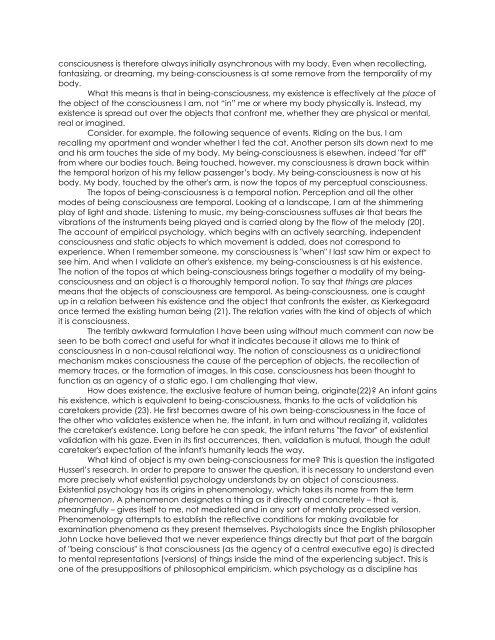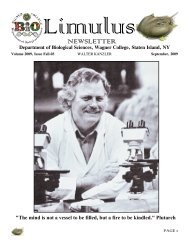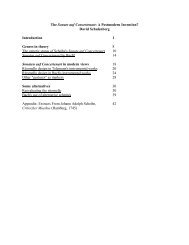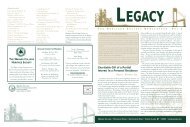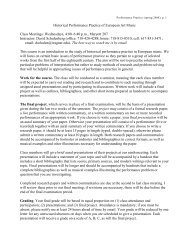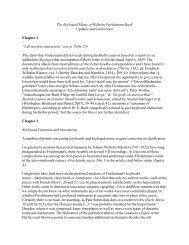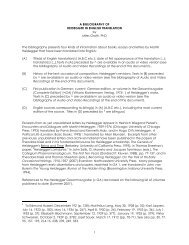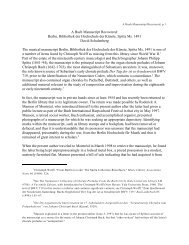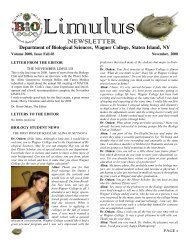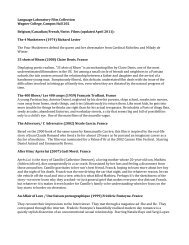SEVEN PAPERS ON EXISTENTIAL ANALYSIS ... - Wagner College
SEVEN PAPERS ON EXISTENTIAL ANALYSIS ... - Wagner College
SEVEN PAPERS ON EXISTENTIAL ANALYSIS ... - Wagner College
You also want an ePaper? Increase the reach of your titles
YUMPU automatically turns print PDFs into web optimized ePapers that Google loves.
consciousness is therefore always initially asynchronous with my body. Even when recollecting,<br />
fantasizing, or dreaming, my being-consciousness is at some remove from the temporality of my<br />
body.<br />
What this means is that in being-consciousness, my existence is effectively at the place of<br />
the object of the consciousness I am, not “in” me or where my body physically is. Instead, my<br />
existence is spread out over the objects that confront me, whether they are physical or mental,<br />
real or imagined.<br />
Consider, for example, the following sequence of events. Riding on the bus, I am<br />
recalling my apartment and wonder whether I fed the cat. Another person sits down next to me<br />
and his arm touches the side of my body. My being-consciousness is elsewhen, indeed "far off"<br />
from where our bodies touch. Being touched, however, my consciousness is drawn back within<br />
the temporal horizon of his my fellow passenger’s body. My being-consciousness is now at his<br />
body. My body, touched by the other's arm, is now the topos of my perceptual consciousness.<br />
The topos of being-consciousness is a temporal notion. Perception and all the other<br />
modes of being consciousness are temporal. Looking at a landscape, I am at the shimmering<br />
play of light and shade. Listening to music, my being-consciousness suffuses air that bears the<br />
vibrations of the instruments being played and is carried along by the flow of the melody (20).<br />
The account of empirical psychology, which begins with an actively searching, independent<br />
consciousness and static objects to which movement is added, does not correspond to<br />
experience. When I remember someone, my consciousness is "when" I last saw him or expect to<br />
see him. And when I validate an other's existence, my being-consciousness is at his existence.<br />
The notion of the topos at which being-consciousness brings together a modality of my beingconsciousness<br />
and an object is a thoroughly temporal notion. To say that things are places<br />
means that the objects of consciousness are temporal. As being-consciousness, one is caught<br />
up in a relation between his existence and the object that confronts the exister, as Kierkegaard<br />
once termed the existing human being (21). The relation varies with the kind of objects of which<br />
it is consciousness.<br />
The terribly awkward formulation I have been using without much comment can now be<br />
seen to be both correct and useful for what it indicates because it allows me to think of<br />
consciousness in a non-causal relational way. The notion of consciousness as a unidirectional<br />
mechanism makes consciousness the cause of the perception of objects, the recollection of<br />
memory traces, or the formation of images. In this case, consciousness has been thought to<br />
function as an agency of a static ego. I am challenging that view.<br />
How does existence, the exclusive feature of human being, originate(22)? An infant gains<br />
his existence, which is equivalent to being-consciousness, thanks to the acts of validation his<br />
caretakers provide (23). He first becomes aware of his own being-consciousness in the face of<br />
the other who validates existence when he, the infant, in turn and without realizing it, validates<br />
the caretaker's existence. Long before he can speak, the infant returns "the favor" of existential<br />
validation with his gaze. Even in its first occurrences, then, validation is mutual, though the adult<br />
caretaker's expectation of the infant's humanity leads the way.<br />
What kind of object is my own being-consciousness for me? This is question the instigated<br />
Husserl’s research. In order to prepare to answer the question, it is necessary to understand even<br />
more precisely what existential psychology understands by an object of consciousness.<br />
Existential psychology has its origins in phenomenology, which takes its name from the term<br />
phenomenon. A phenomenon designates a thing as it directly and concretely – that is,<br />
meaningfully – gives itself to me, not mediated and in any sort of mentally processed version.<br />
Phenomenology attempts to establish the reflective conditions for making available for<br />
examination phenomena as they present themselves. Psychologists since the English philosopher<br />
John Locke have believed that we never experience things directly but that part of the bargain<br />
of "being conscious" is that consciousness (as the agency of a central executive ego) is directed<br />
to mental representations (versions) of things inside the mind of the experiencing subject. This is<br />
one of the presuppositions of philosophical empiricism, which psychology as a discipline has


